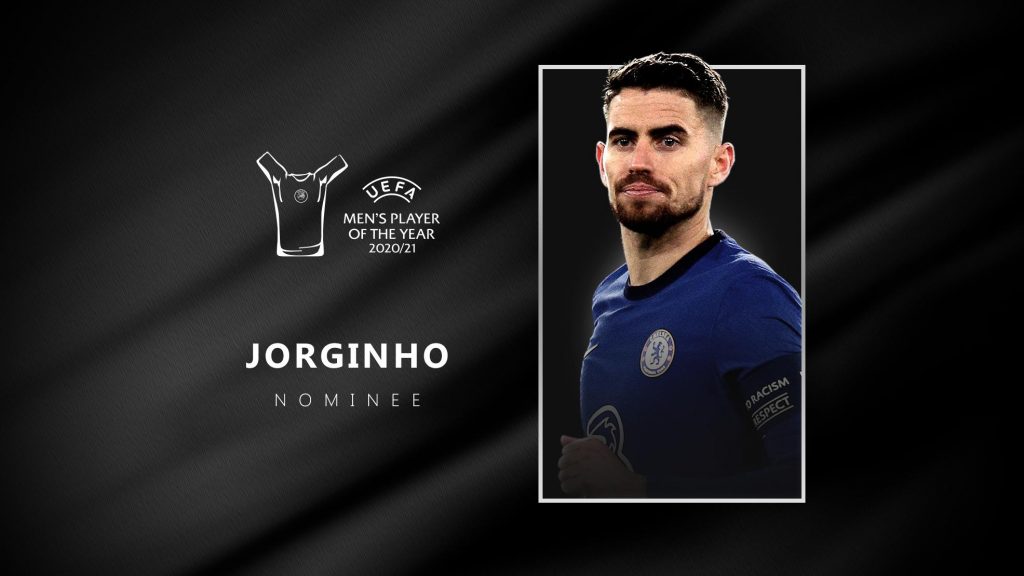The Ballon d’Or and the UEFA Men’s Best Player awards are the two most coveted individual trophies within men’s football. The ceremonies are star studded, the candidates boast extraordinary statistics and feats, and the football world argues relentlessly over which incredible athlete deserves the immortalisation of their performance in the records. So, it is little surprise, that winners and nominees alike are littered with some of the most flair-gifted, impressive footballers that the sport has ever seen; Lionel Messi, Cristiano Ronaldo, Neymar, Andres Iniesta just to name a few. In fact, even those who may not fit into the flair category who receive nominations do so on the basis of their extremely high-level consistent technique, earning recognition as the best in their positions in world football.
So why then, when the UEFA’s Men’s Best Player for the 2020/21 season came out, did Jorginho’s Champions League and Euros winning season crowning him as the top performer on the continent arouse so much clamour and disgust?

Delving into the answer reveals that it less so comes down to Jorginho’s performances but more so a lens through which how football is viewed by the average consumer. The aim of the sport is to simply win games by scoring goals, while simultaneously aiming to quell the opposition from doing likewise. While a joint responsibility, the asymmetry becomes apparent as one can’t win without scoring goals but can win despite conceding. This naturally puts heightened pressure one way, with goal scoring being the most important and difficult part of the sport and thus the general assessment of who the best players are becomes those who ‘make goals and goal scoring chances happen’.
Now at this point, you might disagree and perhaps say that well, Virgil van Dijk and N’Golo Kanté are two players who are recognised currently as the world’s elite who don’t necessarily do the two things I’ve mentioned. I would agree only to an extent, I feel Virgil embodies the quintessential ‘perfect modern centre back’ with his already elite aerial and defensive abilities. However, unlike other great central defenders, his range of passing, calmness, and comfortability to play forward passes takes him to a new echelon of player. His absence in the Liverpool side was painfully clear in their prolonged stagnation without him, and when he won the Men’s Best Player award in 2019, he was rightfully heralded as a major reason for the back-to-back UCL final appearances for Liverpool. As for the Frenchman, Kanté’s quickness, strength and dribbling ability which makes him appear to be a whole midfield packaged in one player has been years in the making at both Leicester City and Chelsea. Although for parts of his Chelsea career he has been slightly misunderstood for what he brings to the side, he will certainly go down as an all-time great.

But when we assess Jorginho, there appears to be a disconnect. A simple eye-test will tell you that Jorginho is not a physically imposing player. As many football fans have remarked, this was a particular flaw on the transition, with viral clips of Jorginho being easily passed on the counter. Jorginho hardly scores goals from open play, his assists are far and few in between and his performances hardly gather crazy skill montages to rack up thousands of retweets on Twitter.
Ideal 10/10 performances from award winners are meant to be littered with key moments that determine results. Whether it’s Van Dijk neutralising the oppositions biggest threat, a Messi, Ronaldo or Lewandowski hat-trick, it should be plainly obvious even to a casual fan.
Jorginho’s 10/10 performances for the most part, are not particularly perceived as such. They are often simplified to ‘merely passing the ball sideways’ and just being on the ball a lot in a Chelsea victory.
Players in the mould of Jorginho are not appreciated, they are held to an unfair standard which diminishes their importance yet jumps on their every mistake. To fully appreciate Jorginho, you must understand greatly how important pressing is to football today. The game has evolved to the point where attack is truly the first line of defence and vice versa. Defensively positioned midfielders, especially in the Premier League and Champions League are under immense pressure every time they touch the ball.

The ability to move the ball through phases of play efficiently under pressure is one of the hardest and has been used as a stick to beat down other defensive midfielders who become press targets for the opposition. While lacking the physicality of a Declan Rice or Wilfred Ndidi, Jorginho has confidently shown occasion on occasion that despite some blunders, he is for the most part press resistant. His ability to take the ball on the turn, offload the ball quick where needed, composure and premeditation to cut out opposition attacks start attacks, find teammates in space are significant contributions to both Italy and Chelsea and whether you can appreciate it or not, Jorginho’s contributions were integral for both the team honours he won.
But that last sentence brings us back to the original gripes many have with his award. Team honours. Jorginho’s contribution is integral no doubt, but the award is purely contingent on his team’s achievements. His Euros’ performance wouldn’t have changed had in an alternate timeline, England had converted their penalties and won the Euros. In fact, the feeling would have been that he isn’t even deserving, dismissed and underappreciated as he has been for most of his career.
Asking whether Jorginho deserved the UEFA Men’s Best Player award asks a greater question that simply just whether his performances merited the award, but whether the concept of this award can ever be justifiably allocated outside the realm of the goal-makers. Many will point to Jorginho’s achievement as an Americanisation of the sport, or even more candidly the product of a narrative but what this shows if anything, is how inherently the lack of understanding and consideration for a certain type of position in football is.
With that being said, I believe that individual awards have been and always will be for the goal-makers, with only the incredible ‘Superman’ defender or goalkeeper with an undeniably elite season to challenge. Jorginho won an award that was never designed for him, and for that reason I can’t help but defend it.
